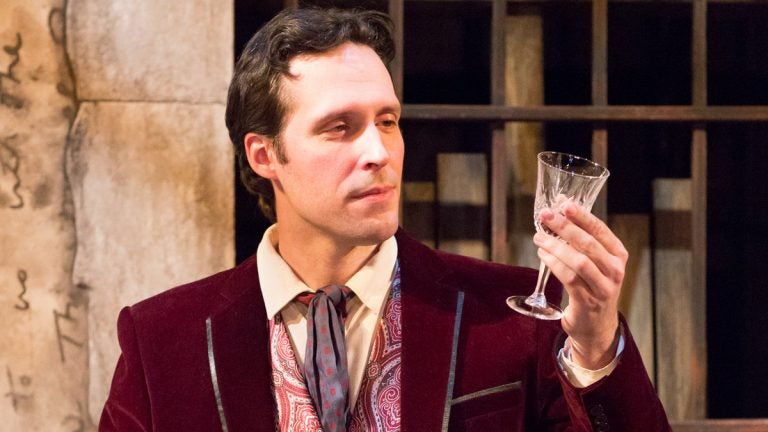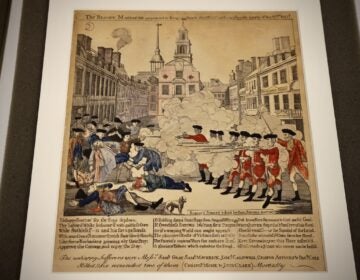Review: ‘From the Depths,’ will the real Oscar Wilde please rise?
Listen
Marc LeVasseur as Oscar Wilde in Lantern Theater Company's 'Oscar Wilde: From the Depths,' a new play by Lantern's artistic director, Charles McMahon. (Photo courtesy of Mark Garvin)
It’s a rare depiction, to my mind, that treats the playwright Oscar Wilde as an actual human being and not some cartoonish, foppishly witty, sexually wanton buffoon. The new play “Oscar Wilde: From the Depths” is that rare depiction. Its world premiere here at Lantern Theater Company is an ambitious undertaking that aims to plumb the depths of Wilde’s mind – a mind as vivid and urgent as his body is tortured and broken by the hard labor he’s been ordered to serve at Reading prison.
How Wilde got there is a question that could be answered many ways, not the least of them involving Wilde’s own hubris. How he got there is also the subject that gives “From the Depths” its spine and, oddly, weakens the play substantially. I suspect the parts of “From the Depth” that most interested and satisfied its author, Lantern’s artistic director Charles McMahon, are those moments (that feel long) when Wilde speaks about his life and his dire situation to no one in particular, which I take to be us. They are the moments when writerliness and imagination can blend to tie insights with a profound sort of poetry.
And sometimes, that’s just what happens. Other times, “From the Depths” is truly from the depths, a place that blends ponderousness with florid language and feels like an exercise in overdosing. A riff using the idea of masks as a metaphor, for instance, is nearly impossible to parse, and then shows up again and again. “Hard forces,” Wilde tells us in rarified terms, “have crowded out the delicate phantoms of my past life.” He is a “cast of characters to myself … all of them lost.” (In fact, whatever character he was to many audiences, his trial and jailing came at the height of wild success.) And “no monster of antiquity was made to bear as I was.” Was the man who wrote one of the great comedies of our language, “The Importance of Being Earnest,” ever so high-falutin?
The answer is, he could be. During the second year of his hard-labor sentence – he was jailed for what they casually called “buggery” with the young Lord Alfred “Bosie” Douglas – Wilde wrote an intellectually weighty tome called “De Profundis,” a far-reaching exploration of everything from the way confinement shaped his thoughts to the way Jesus was an artist. It’s a must-read for anyone who wants to understand how this master-intellect integrated all his experiences into a world-view by the end of his life. (Wilde died two years after his release, at age 46.) “De Profundis” provides rich pickings for McMahon in his script for “From the Depths.” He just overpicked, and possibly over-thought.
Contrast these scenes, which go round and round with the question how did I come to be here?, to others in which Wilde interacts with people both before he was jailed and while imprisoned. McMahon skillfully weaves the dialogues forward and backward in time, sometimes as a part of Wilde’s imagination, sometimes as real events. McMahon’s playwriting here is brisk, muscular and altogether believable – and when Wilde speaks in these interchanges, we know much more about the way he thinks than we do from his prison meanderings.
OK, so “From the Depths” is a mixed night but a sincere and thoughtful one, both when it purrs with fine-tuned precision and when it bogs down – and it alternates from one to the other throughout. Its ideas are frequently exciting, as when Wilde confronts the notion that he could flee to France or America and leave the commotion about his sexual proclivities behind. (A commotion he started by suing his lover’s nasty father, who left a note on a calling card labeling Wilde a sodomite.) There’s a nuance to this Wilde, who takes the side that he’s right because the same society he lampoons in his plays is dead wrong – despite what the law or the facts say.
Lantern’s production, directed with a keen sense of movement by M. Craig Getting on Lance Kniskern’s cold prison set, is superb. And even though “From the Depths” needs an edit of about 15 minutes – how many times must we hear Wilde question his own trajectory? – Marc LeVasseur as Wilde does an exceptional job making the time well spent. Not only is his performance remarkable for the genuine character he presents, his looks are somewhat like Wilde’s, or the way Wilde might look today instead of in the late 19th century. He’s got the same hair and a similar smooth and long face, which he uses to telegraph flashes of arrogance and elitism but also vulnerability.
Jered McLenigan and David Bardeen are compelling as his lover Bosie and his best friend, respectively, and each is impressive in a number of other fast-switching roles. Cheers to Leonard Kelly, the dialect coach who ably juggled many variations on the way our language sounds, and to the company for putting together a precise timeline of Wilde’s life and an explanation of hard labor at the time. Both pieces appear in the show’s playbill, and if you read them as an embellishment after you see “From the Depths,” you’re doing the right thing. Reading them beforehand will not allow McMahon’s play to speak for itself, which it has no trouble doing.
“Oscar Wilde: From the Depths,” produced by Lantern Theater Company, runs through Feb. 14 at St. Stephen’s Theater, behind St. Stephen’s Church on 10th Street between Market and Chestnut Streets. 215-829-0395 or www.lanterntheater.org.
WHYY is your source for fact-based, in-depth journalism and information. As a nonprofit organization, we rely on financial support from readers like you. Please give today.




